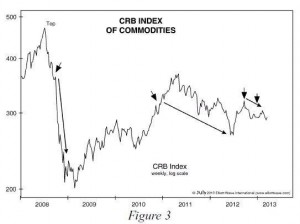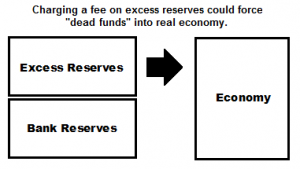Traditional wisdom tells us that when the money supply expands the price of commodities rises. Today Robert Prechter takes a look at what has actually happened to commodity prices since 2008 during a period when theoretically the FED has been pumping up the money supply. ~Tim McMahon, editor Commodities Falling Despite QE: What Does That Mean? Robert Prechter: "Charts tell the truth. Let's look at some charts." By Elliott Wave International During QE3, the latest round of the Fed's quantitative easing, the stock market rose. We all know that. But did you also know that commodities fell? That's right: QE3 had zero effect on commodities -- or maybe even a negative effect. In … [Read more...]
Lawsuit Settlement Inflation
Our society is becoming increasingly litigious with people suing for almost anything. And lawsuit amounts have skyrocketed over the last 50 years. One typical example is in the asbestos litigation category. Although, asbestos use was halted in the 1970s, due to the long period before symptoms of asbestos damage shows up, asbestos related lawsuits are still prevalent. In the United States, approximately 600,000 people have filed suits claiming damages caused by asbestos, and asbestos litigation has become the largest mass tort in history. Despite the decline in the number of people diagnosed with asbestos related diseases (such as mesothelioma cancer) since the 1990s, asbestos litigation … [Read more...]
Active Trading Methodologies
There is a big difference between "Trading" and "Investing". Investors research companies and then based on the fundamentals of the company they buy stocks for the longer term and expect the growth prospects of the company and the industry and the overall economy to take care of the growth of their portfolio. "Active trading" on the other hand is much more like a full time job. It requires watching your investments much closer and buying and selling more often. Thus the commissions you pay are much higher and so finding a broker with low fees is also critical. Position Trading (Long Term) According to Investopedia "Many position traders will take a look at weekly or monthly charts to get … [Read more...]
Current Inflation Commentary for December 2013
Current Annual Inflation Commentary Annual Inflation: Annual inflation rose was 1.24% in November and rose to 1.50% in December. Monthly inflation for December 2013 was -0.01 or virtually Zero. Going by the Consumer Price Index which was 233.049 in December, 233.546 in October and 234.149 in September prices were "rolled back" to below June levels when they were 233.504 but greater than May when they were 232.945. Annual Inflation was 1.50% in spite of the FED buying $85 Billion a month in Bonds lending more credence to Robert Prechter's Deflationary scenario. You can get Robert Prechter's 90 page deflation survival guide free here. Historically monthly inflation rates tend to be … [Read more...]
Living Longer: Health Care, Life Insurance and Retirement Costs for U.S. Citizens
At first glance, one would tend to assume that living longer is a blessing. One gets to spend more time enjoying the company of loved ones, see grandchildren grow up, etc.. However, it’s also worth wondering how current standards of longevity for U.S. citizens tie in with the hefty costs of medical care, the issue of purchasing life insurance, and the cost of retiring. Let's take a look at how much we’re actually spending on health care compared to other countries, how longer lives impact our life insurance premiums, and whether or not we should all just find a different country to retire to. Health Care Costs in the U.S. Obamacare was definitely not the first time the issue of health care … [Read more...]
How “Excess Reserves” and the Money Multiplier Could Trigger Inflation
Banks have $2.5 trillion parked in "excess reserves". This is money on deposit with the FED. The FED pays a miniscule amount of interest on these reserves but the banks are willing to loan it to the FED because it is easy no risk income. But it is also the reason that the money multiplier is falling! And when the money multiplier is falling the FED has a very hard time increasing the money supply. So if the FED really wants to increase the money supply all it has to do is decrease the interest rate it pays on excess reserves and the banks will find some place else to deploy it. Which could trigger massive inflation. ~Tim McMahon,editor A Fed Policy Change That Will Increase the Gold … [Read more...]
Inflation Expectations and the FED
As inflation expectations rise the FED has less and less "wiggle room" to stimulate the economy. But how do you measure "inflation expectations"? In today's article, Chris Ciovacco will show us. ~Tim McMahon, editor Low Inflation Leaves Fed’s No Taper Door Open Fed Lost Control In 2008 In early December, we used Japan as an extreme example of why central banks are terrified of allowing their respective economies to slip into a deflationary spiral. Do the same concepts apply to the United States? They do. The federal government offers standard Treasury bonds (IEF) and Treasuries that provide some protection against inflation (TIP). The law of supply and demand tells us that when demand … [Read more...]
FED Looks for New Ways to Crank Up Money Supply
With all the talk about "Tapering" you'd think the FED was actually considering reducing it's money pumping. But in actuality that is not it at all. The FED is afraid that it is creating a a bubble in the stock market so it is looking for ways to continue its pumping but shift it enough so that the money goes somewhere besides just to the stock market. In other words, it is still worried about the economy and realizes that it is doing more harm than good but feels trapped, so it is looking for new ways that might work better. If the FED can figure out how to free up the log jam of "excess reserves" held by the banks, liquidity could be sloshing around the economy before you know it and … [Read more...]
Understanding Inflation and What to Do About It
Inflation erodes our purchasing power causing manufacturers to have to raise prices or reduce quantities in order to make the same profit margin. Neither consumers nor manufacturers benefit, so who does? Why is inflation so prevalent? Yes, the level of inflation will vary and may recede briefly but the erosion continues. To say that low inflation is better than high inflation is like saying a death of a 1000 cuts is preferable to beheading. Either way you are dead, one just takes longer. With low inflation however you may not notice the cuts since they are so small. Unfortunately, just because the government says the cuts are small doesn't mean that they actually are. See Can We Trust … [Read more...]
The FDA Thinks You’re Stupid
I always bristle when I hear that the government is doing something for my own good. Generally, I prefer to decide what's best for me by myself. Obviously, there are exceptions relating to criminal behavior and dishonesty but in most cases, I figure I am a big boy now and I can make my own decisions and take care of myself. In today's article Chris Wood looks at another instance of the Federal Government pushing business around. In this case, it's the FDA. Take a look and decide for yourself if this is where the FDA should be focusing its efforts. ~Tim McMahon, editor. The FDA Thinks You’re Stupid Does the FDA think you're too stupid to have access to your own genetic information? It … [Read more...]










